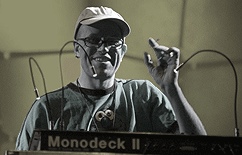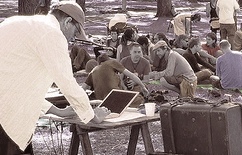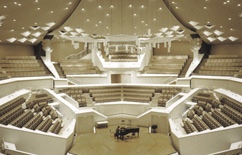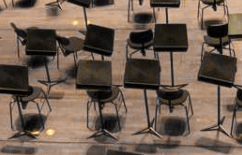in the Age of Supercomputing II [2009]

In 2007 I wrote a fragmentary essay, "Live Performance in the Age of Super Computers". It mainly focused on the challenges and open quesions when it comes to live performance with a laptop. I never finished it, because I was not able to come up with satisfying answers or solutions. However, the topic never left my head, for the simple reason that I am a performer by myself. Now its time to sum up some findings and ideas. Welcome to the hitchhikers guide to live performance in the age of super computers!
If what we deliver as performers shall be perceived as good, we first need to find out what that highly subjective notion of good could stand for. It might even be that good could mean very different things for diferent people, depending on the point of view.
We will approach it from the outside first. What could an audience like? A typical audience usually consist in parts of people who are familiar with the work of the artist, and of some people who are not familiar with it. The first group hopefully also consists of a lot of fans, who are explicitly there to experience the artist and his/her work. If the music and the situation supports it, some folks might want to dance, while others might prefer serious listening. And some members of the audience might be musicians themselves and judge music from a more informed perspective then the rest of the crowd.
We can assume that the different expectations of such an diverse group of people creates diverse ideas about what is perceived as good. And we know that this is the case if we simply ask our best friends how they liked a specific performance they saw recently and end up in a long dramatic discussion.

A happy performer, Detroit, DEMF 2007
Let's have look at the fan. Fans have a high familiarity with the work of the artist. Sometimes they know more about the music than the artist him/herself. They have the whole release history in mind, they were at the last five concerts, and they read all the interviews. This is a chance and a risk. Fans can be ultra-euphoric but they are also the group of people who can become most upset if they think what the performer, their performer, delivers is not good.
The fans know the works of the artist inside out, and this means they can recognize the songs we play. Since we assume they are our fans because they like our songs, we could come to the conclusion that playing music they recognize is a good thing. Great! Lets define the first rule for a successful performance:
(1) Play stuff the audience knows
Nothing can go wrong with that. The only way to make it even better is by applying another obvious recipe:
(2) Only play hits
I mean, you know probably which of your songs the people like most, so simply play those and not the other rubbish you put on your last CD to fill up 60 minutes. Now we are going to add all possible ingredients to the scenario above to make it perfect: The music is played by a band of skilled musicians, and not just running from a laptop, the light is great, the sound is great. Isn't it great, how great it all is!
Does such a performance deserve that a drunken idiot shouts out loud: "boooooooring!!!!". Well... yes. Because besides all the effort that might have been undertaken to recreate the best-of collection on stage, the result is less exciting than what any average DJ could do with your work! The DJ would not just play song after song, he would mix it, enrich it with other peoples material, put it into a new context, create a new flow, and all of that with years of experience in his metier. And by applying the DJ wizard-ness, he or she would create something new, and exciting. The performer, who reproduces his work on stage in perfect studio-sound does not create anything that goes beyond the expectation of the audience. What he or she does becomes totally obvious after the first few songs. And boring indeed. At least for the fans or other folks who care. People who are not familiar with the artist's work by nature will not recognize this, but everyone will feel that a certain euphoric empathy, that can only come from those who know, and who you, the performer, needs to have on your side, that this euphoric reaction is not happening. If you are a band, there is still a chance that people appreciate the technical skill set of the musicians. But if you sit behind your laptop and it sounds exactly like on a record, most people will assume that what's happening right in front of them is: playback of a mixed track. And we all know that exactly this happens now and then if someone plays 'live' : "Boooooooring!!!!" at least.
What the informed audience wants is something else, something unexpected, something that grabs their attention. This leads to the third rule:
(3) Surprise your audience
Which is obviously a contradiction to (1) and we need to come back to this later. But for now we focus on (3). Not every surprise is a good one. A computer crash on stage is quite a massive surprise, but it is unlikely that the performance benefits from it. I say, 'unlikely', and not 'impossible', because I once managed to turn a crash successfully into a standup comedy. But in general the surprise should be more on the side of the audience.
I recently had the incredible joy to experience Steve Reich's piece 'Drumming' performed live here in Berlin. I know the piece, but to hear it performed live was a very different experience. And actually totally mind-blowing. A more analytical perspective might help to isolate some factors that contributed to that positive experience. First of all, the piece was performed at the Kammermusiksaal of the Philharmonie here in Berlin.
That space is such a beautiful jewel of architecture, it radiates calmness, focus, and openness. You enter the foyer and feel anticipation. And once you are finally seated inside the concert hall itself, the outside world is gone, and all your senses are focusing on what to experience next. This is obviously a great starting point both for the audience and for the performer. It is a place that creates and provides the conditions for a good performance. I will come back to the role of the space later in more detail. For now, we simply state a new rule:
(4) Choose a great space.
The next thing to notice at that evening was the arrangement of the instruments on stage. A large row of bongos in the front, three marimbas, and three glockenspiels, all arranged nicely on the empty stage, some chairs on the left and right side of the stage for the musicians and next to the chairs on the floor on a piece of black fabric for the mallets. So, even without knowing anything about the piece that will be performed, the stage already tells a story. During the concert, the musicians either played their parts, or went back to their chairs.
This little bit of well choreographed stage performance underlines that fact that Steve Reich's music is highly structured.
The music is defined by its score, and the score becomes visible by the amount and location of people performing. Everything during the performance including that little ballet of musicians getting up, playing, and sitting down again was about focus, structure and attention to detail. Also worth noticing was the fact that whilst all musicians were dressed in a very formal and classical-music-audience compatible style, they all had slightly differently colored shirts that set them apart from a more conservative orchestra and can certainly be read as a statement in such a context. I examine this in detail here, because I strongly believe that it is important to pay attention to details like how the stage looks, how our equipment is placed there, how we look, how we move on stage and all those things. They have nothing to do with the music directly but they shape how the music will be perceived:
(5) The performance is not just about the music
The piece 'Drumming' starts with a single instrumentalist playing bongos with a mallet. The first few minutes I was almost shocked, confused and disappointed. I had a seat very far away from the stage, and concert halls like that are not build primarily for percussive short signals emitting from a drum.
The reverb of the room dramatically changed the perception of the music and what I was hearing had not so much in common with what I knew from the recording. However, the acoustic of that space worked very much in favor of the more complex parts of the piece where all the overlapping percussion merged into a pulsating, breathing wall of sound of incredible beauty. After all, that space was designed to make music sound great, and even whilst my seat was not perfect for listening to percussions, the overall sound was simply amazing. So what really made the concert such an overwhelming experience was how stunning the composition actually sounded. All known instruments there, not even a lot of them in comparison to a big orchestra, and still: What happened in this room acoustically blew everyone away. Conclusion: If we love music, let's make sure it sounds great!
(6) Make sure it sounds great
The topic of
sound would deserve more than that article, it would need a book, or probably a bookshelf full of them. Most of the time it's simply a shame what goes on here, especially in electronic club music performed in a club. No, it does not make sense to play music so loud that 50% of the audience has to wear ear plugs during the show. And it is a bad idea that a person on stage who has no idea how it sounds where the audience is located, is actually the person who is supposed to be in control over the sound for that audience. No it is not a good idea to drive every single part of the signal chain into total overload.
Most electronic music producers are no professional sound engineers with experience in stage sound, most club technicians or festival PA guys are bored, badly payed, unmotivated and not interested in good sound. And as long as the audience is going to a place 'to party' and the performer is just a provider for that party background, there is not so much hope for a change. However, this is an issue, since it keeps the audience from listening carefully. Bad sound supports bad, simple and predictive music. Bad sound works against any attempt to provide details, and rich color. Whilst volume can create some sense of massiveness and compensate for missing detail a bit, one thing clearly becomes harder to achieve: an emotional impact.
(7) Perform where you can hear the PA
In spring 2008 I was invited to play at the BLOC party in the UK. I arrived at the venue, a big dance-floor, a big stage, four impressive stacks of Funktion One speakers, and a FOH mixer set up at the back of the dance-floor, which happened to be still quite central in that big room. When I arrived an other artist was performing. The sound on the dance-floor was quite good. I walked backstage, entered the stage to set up my equipment and was totally frustrated by the fact that the sound on stage had absolutely nothing to do with the experience down on the dance-floor. I decided that I would want to play next to the FOH mixer and not on stage. The organizers looked at me with a funny expression; a headliner who wants to play off stage at a 2500 people event? Yes. I played where I could actually
play with the PA, where I could shape every detail, every wave of bass, every single snare sound in a way which created the most impact on the dance-floor. And, I was less than one meter away from the people, on their level. It was one of the best Monolake sets I ever did. We all had a great time.

The best possible sound system only serves as a giant amplifier of every mixing mistake one makes as a result of the sound on stage not matching the sound of the PA. This is not an issue for a rock band, where the sound is created and controlled by the man behind the FOH mixer.
A person who knows his/her job and understands what the band wants. For more advanced electronic music this does not work for many reasons. First, most of the time there is simply no person who takes care of that. If there is a person, in most cases, they are from the PA rental companies and listen to rock or R&B. Their idea of music often does not match my idea and vice versa. How shall they know what kind of sound my bass should have? The only person who can decide about it is me. But if on stage the bass sounds horrible anyway, performing with sound is like painting with color under a orange street lamp. Second, electronic music often is more about shaping sound than playing melodies or chord progressions. Unless the FOH mixing guy is really familiar with your style of music he might have a wrong idea about how it is supposed to sound. And, to be fair: what to do if that poor fellow gets a totally distorted and overloaded signal from us. There is not much left over to do in that case....
There is a reason why the most under-complex, most generic music often works best for DJs - a sound design that has been tested in thousands of clubs will most likely work in yet another club, too. However, this does not serve the evolution of music, and it is quite boring. We know that a Roland TR-808 bassdrum does the job in a club. Fine, lets find a less overused sound. How can we do so, if we cannot hear it?
Club music could be far more advanced if the creators would have more control over their work. However, this means investing time and effort in convincing promoters and PA guys. And it means questioning the usual routine. Do I need to be on stage? Do i need to have monitors? Can I find a space in the middle of the room? Am I comfortable not to be seen as the untouchable star far away?
To be continued when ever i find the time for it....
Additional note, December 2015: I would write that last part about sound differently these days. A lot of things changed in a pretty good way, and I am not entirely sure if this is due to the fact that I now play in better venues, or that the quality of PA systems installed became dramatically better. I am also less concerned about generic sounding music - there is a lot of really exciting and fantastic sounding stuff out there.
I guess the rest of my text still makes sense.







